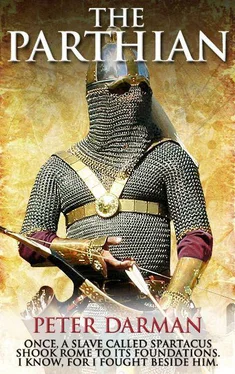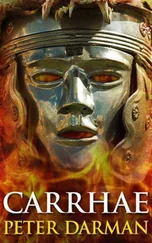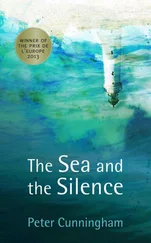Peter Darman - The Parthian
Здесь есть возможность читать онлайн «Peter Darman - The Parthian» весь текст электронной книги совершенно бесплатно (целиком полную версию без сокращений). В некоторых случаях можно слушать аудио, скачать через торрент в формате fb2 и присутствует краткое содержание. Год выпуска: 2011, Жанр: Исторические приключения, на английском языке. Описание произведения, (предисловие) а так же отзывы посетителей доступны на портале библиотеки ЛибКат.
- Название:The Parthian
- Автор:
- Жанр:
- Год:2011
- ISBN:нет данных
- Рейтинг книги:4 / 5. Голосов: 1
-
Избранное:Добавить в избранное
- Отзывы:
-
Ваша оценка:
- 80
- 1
- 2
- 3
- 4
- 5
The Parthian: краткое содержание, описание и аннотация
Предлагаем к чтению аннотацию, описание, краткое содержание или предисловие (зависит от того, что написал сам автор книги «The Parthian»). Если вы не нашли необходимую информацию о книге — напишите в комментариях, мы постараемся отыскать её.
The Parthian — читать онлайн бесплатно полную книгу (весь текст) целиком
Ниже представлен текст книги, разбитый по страницам. Система сохранения места последней прочитанной страницы, позволяет с удобством читать онлайн бесплатно книгу «The Parthian», без необходимости каждый раз заново искать на чём Вы остановились. Поставьте закладку, и сможете в любой момент перейти на страницу, на которой закончили чтение.
Интервал:
Закладка:
‘Up, keep going, we have to clear the tower.’
They duly carried on up the second ladder that was just behind where I stood. The last Roman on this platform was killed when one of my men raced up to him and thrust his sword into his groin, and then he grabbed his collapsed form and hurled it through the wicker barrier. I ran to the edge of the platform and stared ahead, transfixed by the sight that greeted my eyes.
In front of the tower, stretching left and right and into the distance as far as I could see in the darkness, were thousands of soldiers, their shields hoisted horizontally above their heads for protection against the deluge of missiles that was being hurled against them. Dotted among their ranks were burning bundles, which were being fired from the top platforms of the towers. I recognised the smell of sulphur and realised that the Romans were firing incendiary projectiles at the attackers from their catapults, no doubt sulphur mixed with tar, rosin and bitumen.
I raced up the ladder to the second platform, which had also been cleared, but looked up to discover that the trapdoor leading to the one above had been shut.
‘Oil, oil,’ I shouted down at those below. ‘Get lots of oil. Move.’
The lamps that lit the platforms were quickly collected and their contents poured over the wicker screens. More lamps were passed up from below, plus anything wooden that could be broken up and used as firewood. This was heaped in the centre of the platform and then also covered in oil. Then we lit the screens and the woodpile and retreated back down the ladders. When we had reached the bottom the second platform had flared into flames, which licked the thick corner supports and then lit the wicker screens of the top platform. Soon, frantic Romans were looking for ways to escape the platform, but the only way was to jump, which meant death. I looked, both fascinated and horrified, as some of the Romans did jump while others waited to be roasted alive.
‘Back, back to the horses,’ I shouted as the flames engulfed the tower and its wooden supports began to fracture and disintegrate. A few minutes later it collapsed with a mighty crash. We hauled our frightened horses forward and secured ropes to the sharpened logs of the palisade, then tied the other end to our saddles, mounted our horses and then screamed our encouragement as they used their strength to pull each log down. I looked across at the watchtower to my right, which was now in the hands of my men — they had succeeded in taking it with surprise. The tower on my left was also intact and no longer firing at Spartacus’ men. I heard a mighty cheer, and suddenly hordes of men were flooding through the breach made in the palisade, a breach that was widening by the second as more of the palisade was torn down. We had done it, we had beaten the Romans once again. Perhaps we would always achieve easy victories; perhaps we were blessed by the gods. As thousands of troops swept through the breach and headed north, cheering my horsemen as they did so, I began to believe that we were invincible.
But even in that moment of triumph disaster was unfolding on our left, for the gods can be cruel as well as kind.
Burebista’s companies had charged with fury into the Romans forming up in front of their camp, and his men had cut deep into their ranks, killing and routing century after century. He and his men had never seen so many Romans flee in terror, and so they rode them down, speared them, hacked them with their swords, and the Romans kept on running. The horsemen swept into the camp and began firing the tents, until it was aflame. And while this was going on, Burebista was leading the charge with wild abandon, taking him further and further away from the coast road. But not every Roman was running; indeed, the second legion’s camp two miles to the west was stirring, having been alerted by the sounds of battle and then the red glow of the fires that signalled that the palisade and first legionary camp were under assault. And in the half-light and with heavy snow falling, fresh cohorts formed up to face Burebista and his horsemen. The Dacian, flushed with victory, instead of withdrawing steadily in the face of a wall of locked shields, led a glorious, insane charge against the Romans. I heard later that he was the first to fall, pierced by a javelin that went through his chest. Amazingly, with the enemy spear still through him, he carried on advancing until both horse and rider were cut down by a hail of javelins. At first the horsemen actually stopped the Romans, but they could make no impression upon the locked shields and saddles began to empty under volleys of javelins. Leaderless and taking heavy losses, the horsemen fell back, leaving scores of dead on the snow-covered ground.
While this tragedy was being played out, I was marshalling my dragon to provide a protective screen to allow the army to escape north. As I sent two companies to the west to find Burebista’s men and keep a watch for the enemy, behind me the cohorts of the army marched into the darkness and safety. First came the Thracians and Spaniards, the men who had traversed the obstacles in front of the rampart and palisade, and who must have taken heavy casualties. I was dismounted, instructing one of my company commanders to man the two watchtowers directly to our front with more archers, with Gallia’s women grouped around me, who had become my sort of personal bodyguard. I heard Gallia shout and then saw her vault from her saddle and race away. I turned and saw her embrace Spartacus.
I bowed my head to him. ‘Still alive, then,’ he grinned.
‘Still alive, lord.’
‘Where is Claudia?’ asked Gallia.
‘She’s with Akmon and the carts. They are in the rear of the column.’
‘How long will it take to get everyone out?’
‘Two hours, maybe longer,’ said Spartacus. ‘Can you cover our retreat?’
I nodded. ‘Good. I am going to fetch my wife. Keep watch for the Romans. They’ll know something’s up by now.’
‘Did you lose many, lord?’
A pained expression suddenly crossed his face. ‘Too many. But at least we’re out of the pig pen. Keep safe, Pacorus.’
Then he disappeared into the darkness.
I moved my dragon further to the left, past the burning Roman camp, each man straining to see what was happening ahead. It was perhaps half an hour before the first rider’s of Burebista’s dragon came into view, half companies and individual horsemen, tired and demoralised, the heads of their horses cast down. Many bore wounds to their bodies. I ordered them to go north with the army. I stopped one rider, a Dacian with no helmet whose mail shirt was torn and with blood running down a gashed cheek.
‘Where is Burebista?’
‘Dead, lord. Killed in the first charge.’
I sent him on his way and sat in silence, remembering the brave Dacian who had shared in my victories for the past two years. Now he was a corpse covered in snow. It was with a heavy heart that I covered the retreat of the army, as the first light of a grey dawn signalled the beginning of a new day.
We had escaped the Roman noose, but for how much longer I did not know.
Chapter 18
We marched all that day, and the next and the day after that, travelling north along the Popilian Way. We tramped through Bruttium and into Lucania, Spartacus pushing the army hard to get us to safety.
‘If the Romans are moving west from Brundisium, and with Crassus pursuing us from the south, we will be caught in a trap and all our efforts will have been for nothing.’
‘My scouts report nothing on the road to the south, lord.’
‘Keep as many out as possible and as far as possible. The Romans know that they have us on the run and they will scent blood.’
It took us two weeks to reach the River Silarus, the barrier between the provinces of Lucania and Campania. There we found a spot near the upper reaches of the river and made our camp. We at last were able to take stock of our situation. At least the cold weather had abated and the snow had disappeared, leaving a landscape of undulating hills covered in vegetation. The Silarus Valley was known locally as the ‘land of a hundred springs’, and it lived up to its name, with clear, ice-cold water flowing down from the high peaks. Dotted with meadows and woods, the Silarus itself teemed with fish and otters. Spartacus established his camp on the slower, tree-covered slopes of the mountains. I thought it a good position, as no army could approach us from the north as in that direction stood the high peaks of the Apennines, while the east and west were also barred by rocky barriers.
Читать дальшеИнтервал:
Закладка:
Похожие книги на «The Parthian»
Представляем Вашему вниманию похожие книги на «The Parthian» списком для выбора. Мы отобрали схожую по названию и смыслу литературу в надежде предоставить читателям больше вариантов отыскать новые, интересные, ещё непрочитанные произведения.
Обсуждение, отзывы о книге «The Parthian» и просто собственные мнения читателей. Оставьте ваши комментарии, напишите, что Вы думаете о произведении, его смысле или главных героях. Укажите что конкретно понравилось, а что нет, и почему Вы так считаете.












